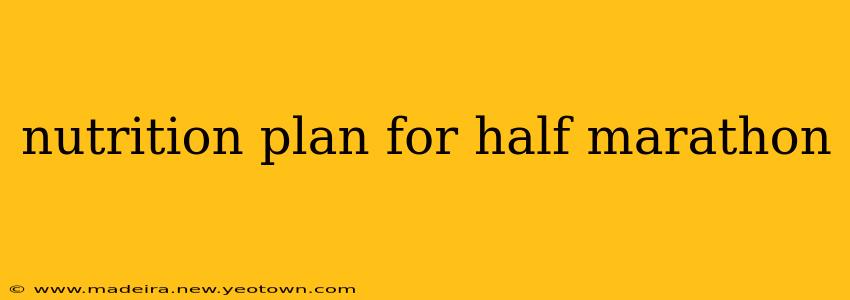The thrill of a half marathon—13.1 miles of pushing your physical and mental limits—is exhilarating. But reaching the finish line strong requires more than just training; it demands a meticulously planned nutrition strategy. This isn't just about eating healthy; it's about fueling your body optimally for peak performance, recovery, and injury prevention. Let's dive into a comprehensive nutrition plan to help you conquer your race.
What Should I Eat Before a Half Marathon?
This question hinges on timing and your individual digestive system. The goal is to provide your body with readily available energy without causing stomach upset during the race. Avoid anything new or experimental on race day.
The week leading up to the race: Focus on complex carbohydrates like whole grains, sweet potatoes, and quinoa. These provide sustained energy. Incorporate lean protein for muscle repair and healthy fats for hormone production. Hydration is key – drink plenty of water throughout the week.
The day before the race: Stick to easily digestible foods. Think oatmeal, toast with banana, or a small portion of pasta. Avoid high-fiber foods that can cause gastrointestinal distress. Ensure you're well-hydrated.
Race morning: A light breakfast 2-3 hours before the race is ideal. This could include a small bowl of oatmeal with berries, a banana, or a piece of toast with a thin layer of nut butter. Avoid anything too heavy or greasy.
What Should I Eat During a Half Marathon?
This depends heavily on the length of your race. For a half marathon, you'll likely need to consume energy during the race, especially if it's longer than 2 hours. This is where carbohydrate gels, chews, or sports drinks come in.
Experiment with different options during training runs to identify what sits well with your stomach. Consume small amounts regularly, rather than large amounts infrequently, to prevent stomach cramps and ensure sustained energy levels. Water is vital; sip it consistently throughout the race to prevent dehydration.
What Should I Eat After a Half Marathon?
Post-race nutrition is crucial for muscle recovery and replenishing glycogen stores. Within 30-60 minutes after finishing, consume a combination of carbohydrates and protein. This could be a protein shake with banana, a sandwich with lean meat and whole-grain bread, or a recovery drink specifically formulated for athletes.
This "replenishment window" is critical. Your body is most receptive to nutrient absorption during this time. Continue to hydrate generously.
How Many Calories Should I Consume When Training for a Half Marathon?
Calorie needs vary depending on individual factors like age, weight, gender, and training intensity. However, runners training for a half marathon generally require a higher calorie intake than sedentary individuals. Consult with a registered dietitian or sports nutritionist to determine your personalized calorie requirements. They can help you create a balanced plan that supports your training without leading to weight gain or loss that could negatively impact performance.
What Are Some Healthy Snacks for Half Marathon Training?
Fueling your body throughout the day with healthy snacks is crucial during your training. These could include:
- Fruits (bananas, apples, berries)
- Vegetables (carrots, celery with hummus)
- Yogurt with granola
- Trail mix (nuts, seeds, dried fruit)
- Energy bars (choose those low in added sugar)
What Supplements Should I Take When Training for a Half Marathon?
While a balanced diet should provide most of the necessary nutrients, some runners find supplements beneficial. However, consult your doctor or a registered dietitian before taking any supplements, especially if you have underlying health conditions.
What Foods Should I Avoid When Training for a Half Marathon?
Processed foods, sugary drinks, excessive caffeine, and alcohol should be limited or avoided altogether during training. These can negatively impact energy levels, hydration, sleep, and overall health.
Remember, consistency and planning are key. Your nutrition plan should be an integral part of your overall half-marathon training strategy. By fueling your body correctly, you'll significantly enhance your performance and enjoy a more successful and enjoyable race experience.

